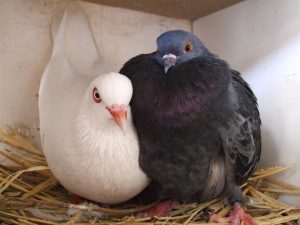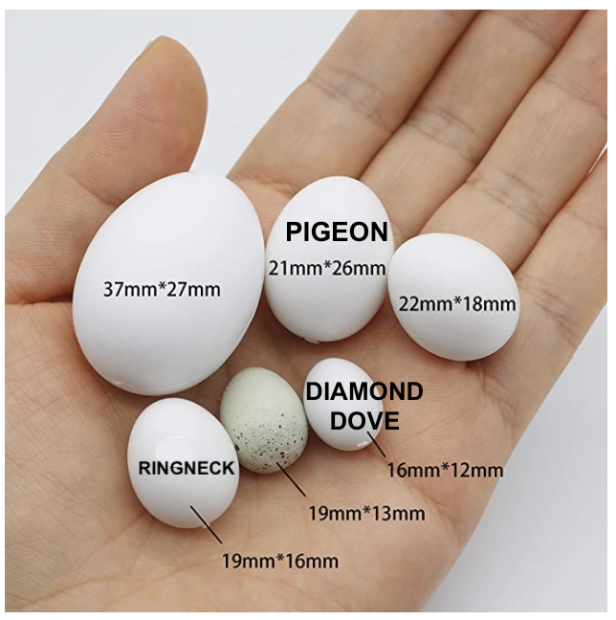By Miriam Hoyt with Elizabeth Young
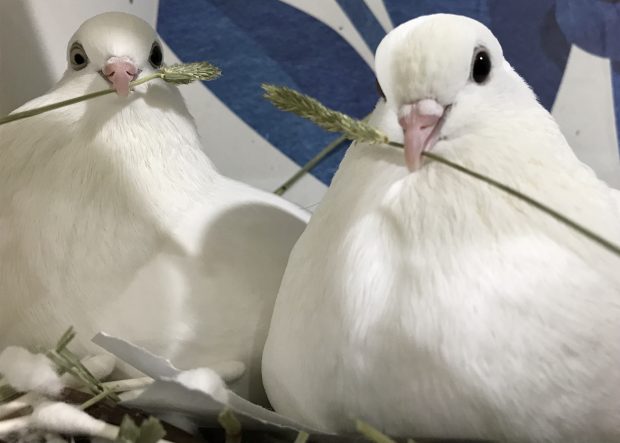
Nesting Homer pigeons Luna & Meadow were rescued as youngsters- lost, starving “dove release” survivors. They’ve always been inseparable & married when they grew up. (Photo by Toni Storms)
(If you’re new to pet pigeons or doves, please read this first.)
Pigeons have an amazing capacity for love. When one of these big-hearted birds finds a mate, the bond between them is usually lifelong. Pigeon couples are so intensely devoted to each other that we refer to pigeon mates as being married. They stay bonded through years of nest-sitting non-hatching (fake) eggs and a healthy partner will stay with their sick mate until they recover or pass. If widowed, they will remarry. Some quickly, some will grieve alone for months. (This article, Shimmy & Dallas: A Pigeon Love Story, is highly recommended.)
If you have only one pigeon (or dove), finding a compatible mate could be a huge benefit to their life. Social isolation can make them depressed and prone to illness. However, bringing home a second bird is not a decision to be made lightly. These guidelines focus on matchmaking for pigeons with some dHarmony for the doves at the end. (What’s the Difference Between Pigeons & Doves?)
Pros and Cons of pHarmony
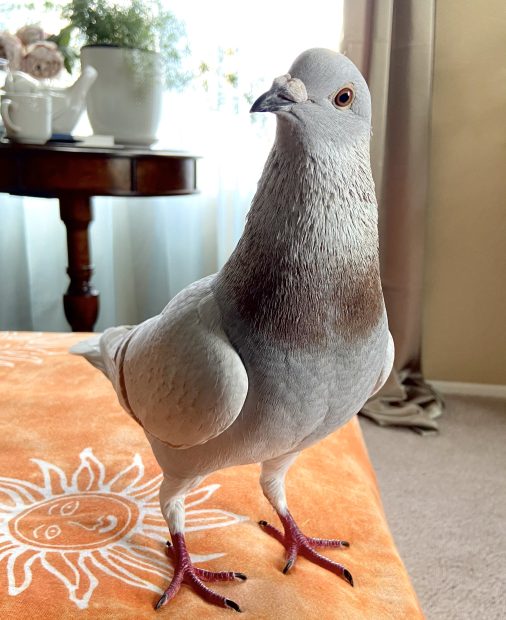
Zephyr: Does he or doesn’t he want a mate? (Photo by Monika Birch)
Does My Bird Want A Mate?
Pigeons are naturally social creatures, and they don’t discriminate when it comes to who they view as part of their circle. Even though you are a human, your bird sees you as part of his flock. This means that sometimes, especially if there are no fellow pigeons around, your bird might choose you as a mate! If your bird is ‘married’ to you, he will preen you, bow coo to court you, and if female, lay eggs. Your bird will demand a lot of your attention, wanting to be around you as much as possible. If your pigeon has already married you, he might reject your attempts to matchmake him with another bird. (It is sometimes possible to ‘divorce’ your bird by withholding interaction but some people pigeons never accept a pigeon mate.)
On the other hand, if your single bird doesn’t have a strong bond with you, or if your bird spends most of his day home alone, is depressed or restleass, he might benefit from a pigeon companion.
People Pigeon?
First – is your pigeon lonesome? Does he want a mate? Or are you your bird’s mate? If your pigeon was raised and lived only with people since a young age, they likely consider themselves a people bird and don’t not want another bird around. It is possible for your bird to get all the social interaction he needs from you with lots of your time and attention. If you spend much of your day away from home, or if you’re too busy to interact with your bird a lot, consider that your bird may be lonely. Getting a second bird could provide that important socialization when you can’t do so yourself. If your pigeon is strongly bonded with you, they will more than likely consider a new bird as a rival and be hostile rather than welcoming. If your people pigeon is bonded to you and gets lots of your time and attention, they probably don’t want another pigeon in their home. If you can’t meet your people pigeon’s social needs and want to adopt another, be prepared for their relationship to take months to develop (if it ever does). You’ll likely need to ‘divorce’ your pet pigeon, ignoring them so completely that they feel divorced and justified in cheating on you and falling in love with the new bird. (Eventually, after they marry and have a couple of months of honeymooning together, your relationship will return and your pigeon will be able to love both their bird mate and you.)

For months, Ethan fostered people pigeon Dodo as a possible mate for his single ladybird Byxbee but Dodo isn’t interested in birds.
Bear in mind having a second bird means twice the cleanup, twice the food and supplies to buy, and twice the potential vet bills! Also consider that there is a chance your matchmaking efforts will fail, in which case the two birds will never be able to share a cage. They don’t have to be married to be good company for one another, just compatible. Unless your birds are confirmed to be the same sex, you need to be prepared to practice hatch prevention, removing and destroying every egg laid – about 20 per year. (If you have a male or possibly male pigeon, you have to assume that the eggs laid are fertile. Never assume they aren’t. Pigeons will sometimes mate with a bird they aren’t married to.) You can order fake pigeon eggs online (these are our favorite) or make your own with hardening craft or modeling clay.
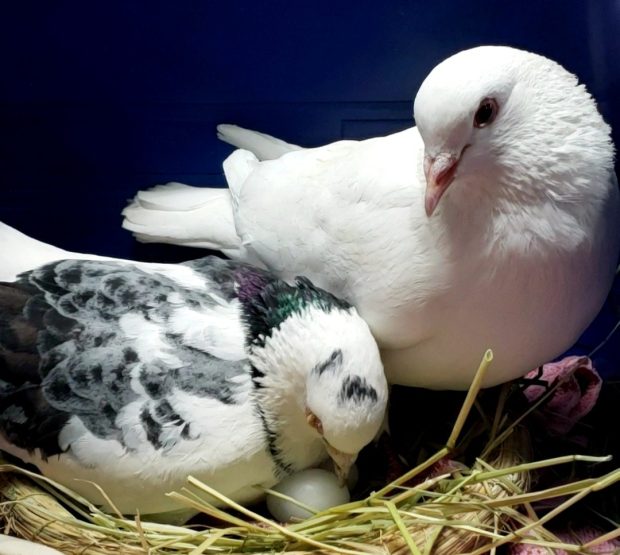
Old man Felix & his wife Myrna taking care of their (fake) egg
Finding a mate for your bird
If you decide to bring a second bird into your life, adopt, do not shop! There are so many beautiful pigeons and doves in need of homes all over. Sometimes rescued, adoptable pigeons and doves can be hard to find but they are out there! Check with local shelters, wildlife rehabbers, bird rescues, online adoption websites and social media bird groups. Palomacy has a list of pigeon and dove-friendly rescues that you can contact. Members of our Palomacy Help Group can also help you find your bird a friend! Sometimes members can even help arrange transport of a rescue bird to you.
Never pair pigeons and doves. There are significant differences not only in size, but in their behaviors and temperaments. What’s normal for doves is rude for pigeons. Squabbles are a natural part of bird life and just one disagreement can be catastrophic or fatal for the frailer dove. Palomacy has a saying, Doves start the fight but pigeons finish it. Stick to birds of the same species. (Different colored pigeons and various breeds like Kings, Fantails, Racers, Homers, Ferals, etc, can pair up, no problem.)
People are sometimes concerned that exposing their bird to a new bird will risk contagion. Palomacy’s experience says no. Healthy, unstressed, noncrowded pigeons have robust immune systems that protect them. Palomacy doesn’t quarantine but you may wish to. Researching on the Internet makes it seem like there are all kinds of diseases that you need to fear but that is because you’re reading about breeders’ and hobbyists’ pigeons who are typically crowded, stressed, and immune suppressed. Their birds are very vulnerable and they have flocks wiped out despite all their precautions (they vaccinate and medicate their birds in “closed loft” systems) because of overcrowding. (Note: If a bird is sick, weak or special needs, they need expert care and to be segregated for safety.)
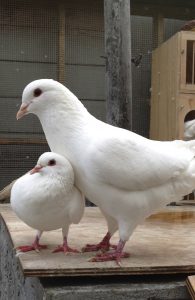
Homer pigeon Pipsy (full grown) & her big, gentle King pigeon husbird Milkshake Mike
Sexing Pigeons & Doves
There is no reliable way to tell the sex of a pigeon or a dove just by looking at or feeling them. (Your odds of accuracy are 50/50.) Sometimes people think they have a male bird until they are surprised with an unexpected egg (which means she’s married to you, only married pigeons and doves lay eggs). Males tend to be more active with lots of strutting and cooing and are more reactive to their reflection when they have access to a big mirror. Females coo & strut too (especially if they are single & no one is courting them) but less than males and they tend to just sit and keep company with their mirror reflection rather than showing off like males do. Inexpensive DNA testing is available (through the mail) to sex birds.
Same-sex marriages do happen amongst pigeons, so you don’t necessarily need to be certain of both birds’ sex to be a successful matchmaker. If at least one of the birds is female, a marriage is likely. Two female birds will often marry each other, especially if no males are present. Each bird will lay infertile eggs and happily sit on them.
Same sex male pairs are less common because male birds view each other as competitors first. That said, sometimes male birds marry each other and they are extremely devoted when they do (though they will squabble even after marriage, especially if you don’t give them fake eggs). Other times, though, they remain persistent rivals, so if you only have the capacity for two birds, it may be prudent to ensure at least one of the birds is female before you attempt to matchmake. DNA testing is available if you want to know your bird’s sex for certain, and of course, only female birds lay eggs. (Male birds still love to nest-sit, though, so giving them fake eggs to sit will bring them a lot of joy!)
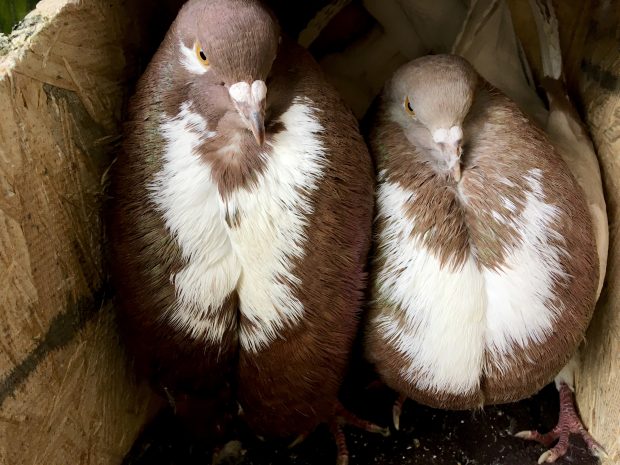
Ray and Fraser, both male, are a very happy, loving gay couple. (They are Norwich Croppers. Their oversized crops are an unfortunate breed-trait.)
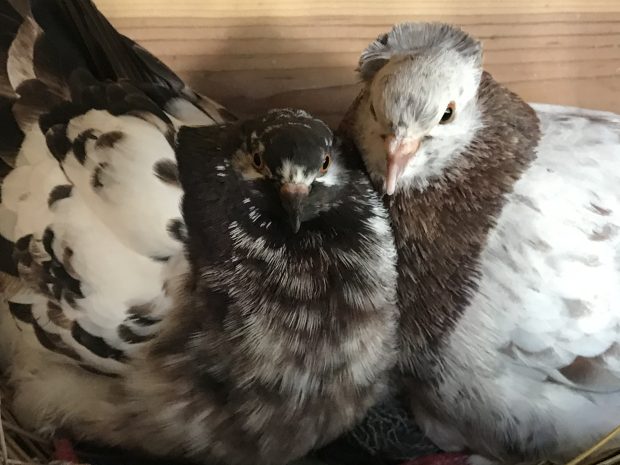
Rhett & Tommy say, Remember, if you have a male & female pigeon, you need to remove every real egg and replace with fakes!
Why Do I Have to Remove Their Real Eggs & Replace with Fakes?
Removing and destroying their real eggs is for hatch prevention (birth control). Birds can’t be spayed or neutered like dogs & cats but they do suffer from the same overpopulation crisis so we must remove & destroy real eggs to prevent pet pigeons or doves hatching more. It is irresponsible, taxing to their health & they won’t want anything to do with the youngsters after they fledge (about 4-6 weeks of age) and will fight. If you have room for more birds, please- adopt!
Replacing their real eggs with fakes doesn’t stop the birds from laying. It just gives them eggs to sit. Pigeons & doves, both male & female, love to egg-sit. It is a very satisfying & important part of their lives. Providing fake eggs allows them that pleasure & also reduces the pressure on the female to lay more. Fake eggs don’t prevent egg-laying. They are just a substitute for their real eggs & you must stay nosy & always know what your birds are sitting on because they sometimes lay a third or even a fourth real egg which will hatch if not caught.
How to Matchmake
You need to know who the birds are. Pigeons or doves? Youngsters or grown ups? Young birds can be friends at first but sometimes grow into rivals as they mature. Pigeons (and doves) don’t reach sexual maturity until they are about four to six months old. Healthy or sick? (Sick, weak or injured birds aren’t much interested in courtship.) Palomacy will sometimes host a single pigeon in an aviary flock to mingle and spark a flirtation with somebirdy and then send both home to continue the courtship. More often, we’ll send a single opposite sex pigeon to foster temporarily in the adopter’s home for pHarmony and that works great. A lonesome pigeon is very practical and often quick to fall in love with the first pigeon suitor they meet. If your bird lives in a room or an aviary (safe, predator and rodent-proof, please), a new bird can be introduced and safely share that big space (with likely some harmless hazing and scuffles). It is important to understand that pigeons (and doves) are territorial and defensive of what they see as theirs (including space, especially their cage and nest areas, and people, and will fight to defend what is theirs). You can’t add a bird to another’s cage or crate until they marry and want to move in together. The new bird needs their own cage next door to the resident bird’s.
Single pigeons Lilith (male) & Amelia starting their pHarmony in small temporary next door get acquainted crates (they eventually married).
They can safely spend out-of-cage time in the house together as long as there isn’t any serious bullying happening. Twin everything to smooth the way for them- two food bowls, two bathtubs, two bricks to stand on, whatever. Parallel, ambient hanging out together is great for birds getting to know each other. If one of the birds is too aggressive, you can alternate their out time, leaving one locked up while the other is out and visa-versa. (We call it time-sharing.) It allows both birds to explore and express themselves safely and helps an over-eager suitor to be less obnoxious. Watch them interact. Their body language will clue you in to how their relationship is developing. Males are usually the more enthusiastic suitor. Sometimes they come on too strong too fast and the female will evade his advances for awhile (or even need your protection). Males will dance, strut and coo to court a mate. Both will make eyes at each other, hang out in the same general area, lounge around contentedly. As things heat up, they’ll both preen themselves, mirroring. When they start preening each other, dancing and kissing, they are engaged! (Remember – even if they never get married, they can be good company for one another as long as they’re compatible.)
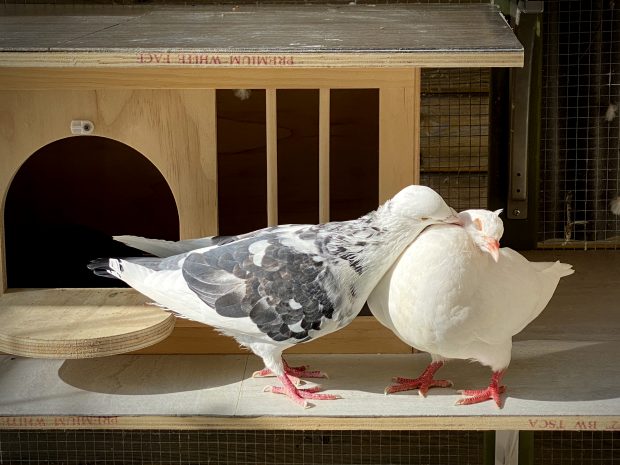
Starbuck lovingly preening his beloved wife Maude
Pigeons Moose and Nike celebrating their marriage
Married couple Moose and Nike kissing (in slow motion!)
Depending on your individual birds’ personalities, it is possible they will show interest in each other right away, but most likely it will take time. Patience is key! Some couples pair up quickly, but shyer birds may take months to decide they like each other. Just because it isn’t love at first sight doesn’t mean a happy marriage won’t happen eventually. When your birds mate, they are married and ready to move in together, sharing a nest for as long as they both shall live.
Cautionary Note: Pigeons are naturally flock birds and males especially burn lots of social energy flirting with all the females and challenging all the males in their flock but in a home setting or small flock with only one or a couple other birds, they can become overbearing and even abusive with so much excess energy. We call it “underemployed male syndrome” and if it happens with your birds, you’ll need to create extra opportunities for him to express that natural energy such as food foraging, daily play fighting with you (use a sock puppet or stuffy), going on errands or adventures with you (safely contained or harnessed) or other enrichments to defuse his frustration.
Dove Love (dHarmony)
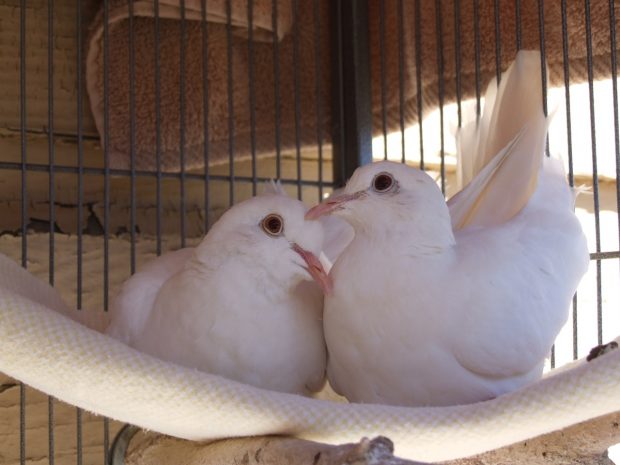
Married Ringneck doves (white coloration) Pierre & Piper (#RelationshipGoals)
Doves are beautiful, gregarious, friendly birds. Their mostly easy-going ways make them good company. Single doves can become quite affectionate and attached to their owners; however, they are social and so if you’re not available to be their significant other, they’ll be happiest with a companion. If you have a male-female pair, you will need to replace their real eggs with fakes. Because they breed so readily in captivity, there are many domestic doves in need of homes so it’s not advisable to raise more doves. All too often Palomacy is contacted by someone who has suffered a change of circumstance and must suddenly attempt to find homes for a whole aviary full of doves. It is not a happy situation for the doves nor their people. Palomacy and all rescues who serve doves or pigeons are already full of birds needing homes.
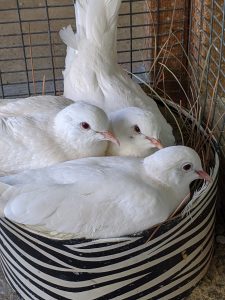
Ringneck doves Shiloh, Honk & Larry Bird are a happy throuple
Ironically, Ringneck doves, considered to be so peaceful and devoted, are more combative and promiscuous than pigeons. And noisier too. (Male doves coo a lot, single or married!) Doves are higher energy and more active. We call doves swingers! Their relationships (in a flock) are much more fluid and flexible than pigeons and we sometimes see dove threesomes.
Ringneck dove Melvin coo coo cooing
Doves are very emotional and dramatic. (Palomacy calls them dramatical.) Ringneck doves love hard and when one is in love with you, you’ll know it. If you are around a lot and have the time and ability to be your dove’s significant other, you might want to keep things as they are. Sometimes, a dove married to a person is too jealous and possessive to tolerate another dove.
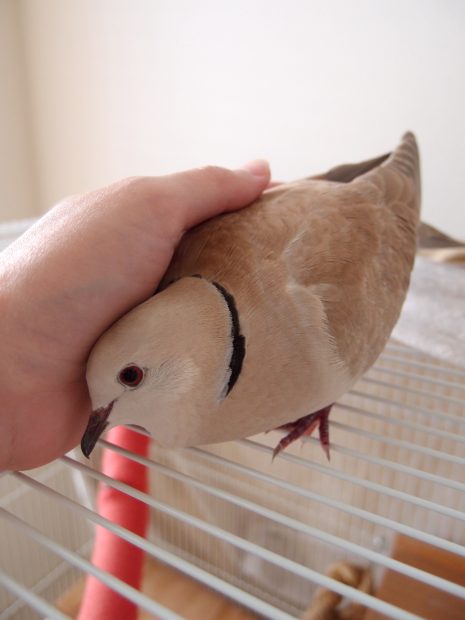
Deedo the dove loves his human wife Nancy very much
If you do bring a new dove into the home, follow the same steps spelled out above for the pigeons. A single pet Ringneck Dove may be housed indoors in a cage at least 24” x 30” (though larger is always better) and needs daily supervised time out of the cage for exercise and interaction with his people. A flight cage 62” high, 32” wide and 21” deep makes a good indoor-safe home for a pair of Ringneck Doves. (See How to Choose a Cage for a Pigeon or Dove.)
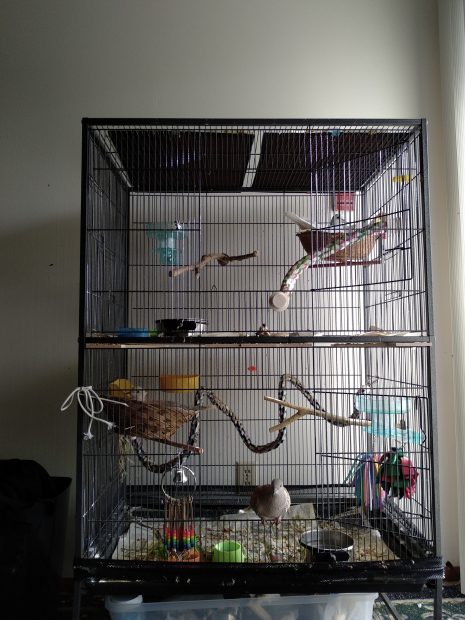
A flight cage makes a great indoor-safe home for one or two doves
Married Ringneck doves Argyle & Skye in a public display of affection
Ringneck dove husbird Melvin preening his wife Lily
Arthur Millet, a Diamond dove, demonstrates his lovely bow coo dance
Diamond doves are really small, not even half the size of Ringneck doves and they should always be kept with another Diamond dove. They are stressed and unhappy living alone. (More about Diamond doves to come in another article.)
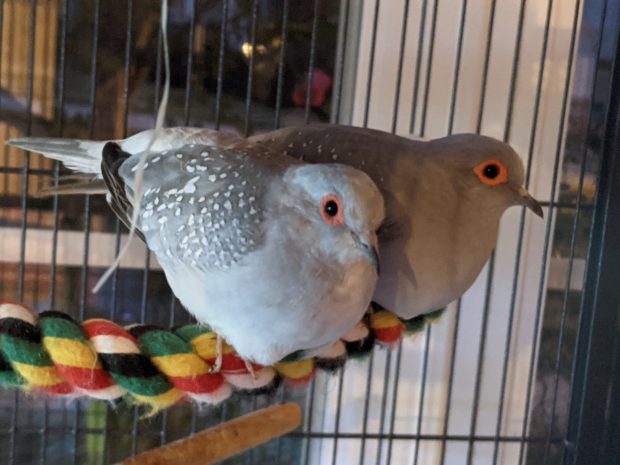
Arthur Millet & Tippi Hendren took six months to marry. Now they’re inseparable.
Have more questions? Need additional information & support? Palomacy’s Help Group is an awesome free resource available 24/7/365 at www.Facebook.com/groups/Palomacy

Miriam Hoyt is a writer and bird enthusiast from Columbia, South Carolina. She discovered Palomacy on Facebook while seeking advice for her delightful diamond dove, Arthur Millet. Since then she’s become a real pigeon proselytizer, talking endlessly about the joy of pet pigeons to anyone who will listen.

